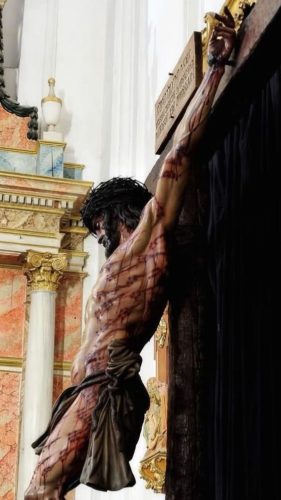
Crucifixes are kind of everywhere, if you look closely enough. We wear them as necklaces, earrings, or tattoos; we use them to decorate our houses; and most churches usually place a cross front and center. Athletes make the sign of the cross when they excel in competition. Vampires are repelled by the mere sight of one. At the center of Christian faith, the cross has become woven into our cultural fabric, becoming a symbol with no obvious referent. The abundance of crosses expresses and enables an indifferent familiarity with Jesus’ own crucifixion that was entirely foreign to the first Christians.
 Crosses were everywhere during the time of Jesus, but for entirely different reasons. This tool of capital punishment was fairly routine for the Romans, employed to humiliate the deceased. Nobles might be sent into exile, some were honorably beheaded, but the many slaves and other detestable criminals of the empire were crucified. Jesus’ shameful death by crucifixion would have been a tough sell to aristocrats and laborers alike. As told in Martin Hengel’s classic book, Crucifixion,
Crosses were everywhere during the time of Jesus, but for entirely different reasons. This tool of capital punishment was fairly routine for the Romans, employed to humiliate the deceased. Nobles might be sent into exile, some were honorably beheaded, but the many slaves and other detestable criminals of the empire were crucified. Jesus’ shameful death by crucifixion would have been a tough sell to aristocrats and laborers alike. As told in Martin Hengel’s classic book, Crucifixion,
This radical kenosis of God was the revolutionary new element in the preaching of the gospel. It caused offence, but in this very offence it revealed itself as the center of the gospel. [… T]o assert that God himself accepted death in the form of a crucified Jewish manual worker from Galilee in order to break the power of death and bring salvation to all people could only seem folly and madness to those of ancient times. Even now, any genuine theology will have to be measured against the test of this scandal.
Hengel’s book focuses exclusively on how the Romans viewed crucifixion, but the same scandal of the cross can be said for Jewish thought at the time. While the Jewish literature often saw martyrdom as noble, the idea of a suffering, crucified Messiah was largely inconceivable — even to Jesus’ own disciples (see Peter in Mark 8). The cross was a scandal to Jews and utter foolishness to the Romans (1 Cor. 1:23).
It should be a shock to us that the means of Jesus’ death was universally disdained by those who first witnessed the event. Likewise, the identification that this crucified Jesus was God himself was pure nonsense to literally everyone. There was no path that could be taken, no narrative to tell, no philosophy that could have reasoned its way to arrive at the belief that God had died while hanging naked on a tree. There was simply no precedent to comprehend (let alone stake your life upon) the idea of a crucified God.
The cross of God marked a rupture of existing beliefs. It enabled a fundamentally new discourse about God, ethics, and history itself. It spurred ingenious reflection on the part of early Christians to make sense of this event. The scriptures they had read their entire lives now bore new, unforeseen meanings in the shadow of the cross. Its themes of kingship, atonement, promise, and law were shattered and reinterpreted in light of the cross of Jesus. The temple was not the place to atone for sin, but an analogy for Christ’s death. What was promised to Abraham was none other than Jesus. The Davidic Messiah would conquer the world not through force, but through suffering.
The novel identification of God in the weakness and infamy of Jesus’ crucifixion requires the re-configuring of all values and worldviews. He elusively transcends our expectations and refuses to be co-opted by our political, economic, or social ideologies. The crucified God refuses to be pressed into service for anything besides his self-determined plan of redemption.
We live in a world consumed by competing ideologies. Whether we like it or not, everything we do reflects our values and beliefs. The kind of clothes we wear is a statement on our views of global capitalism. The kind of cars we drive signals our beliefs about environmentalism. Where we shop for groceries proclaims our views on union rights. We can’t even buy a can of refried beans without it being a political statement. For everything under the sun there is either blessedness or damnation, according to the terms set by whoever holds power.

To be sure, Jesus is routinely enlisted in our many culture wars, as we attempt to speak on God’s behalf about what he wants us to do. This ideological God is robbed of the freedom of his self-disclosure and made to conform to our expectations of what we think a good God would do. The old term for this rhetorical move is blasphemy — ironically, the very charge leveled against Jesus and the early Christians.
The crucified God found no home among the ideologies of his day; they could neither comprehend nor accept such a person. With all due apologies for the cliche, Jesus lived as he died. He was neither a Roman nor a Pharisee, a Stoic nor a Sadducee, an Epicurean nor a Zealot. The kingdom he proclaimed was not of this world. He refused to pick one side and was therefore assailed from all angles.
Jesus’ vision of the world pleased no one, while inviting everyone. At the cross, God identified himself with the entirety of human wretchedness, the curse of death and god-forsakenness that afflicts people of all cultures and ideologies. He is the crucified Lord, and it is solely by his ideology of mercy that we are judged.

COMMENTS
One response to “The Folly of the Cross in Our Divided World”
Leave a Reply













SO good, Todd! I especially like the line “Jesus’ vision of the world pleased no one, while inviting everyone.” We hear and talk about the cross so much that we sometimes forget how radical, controversial, and “foolish” it seemed back then and still now.